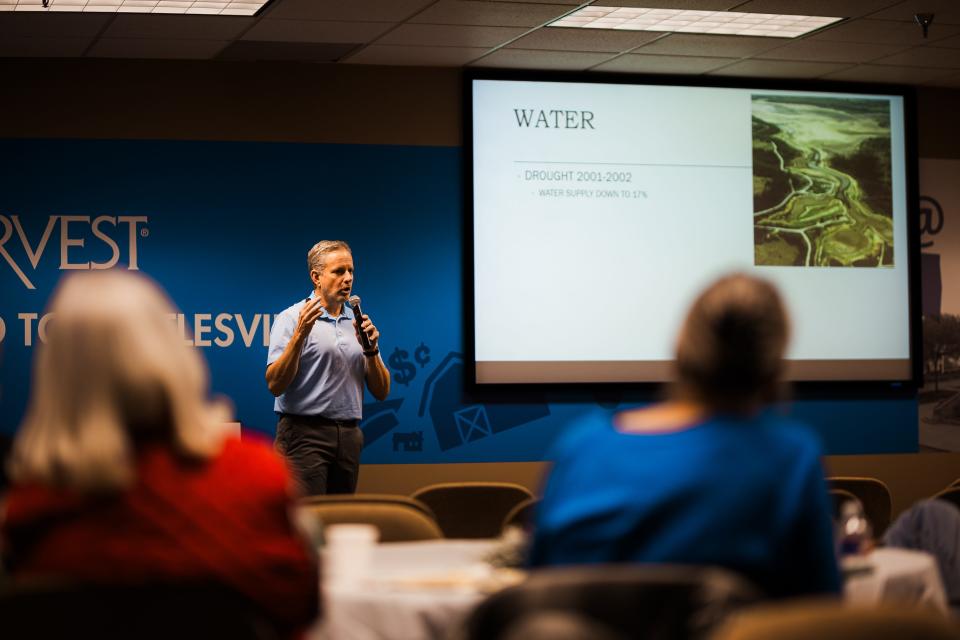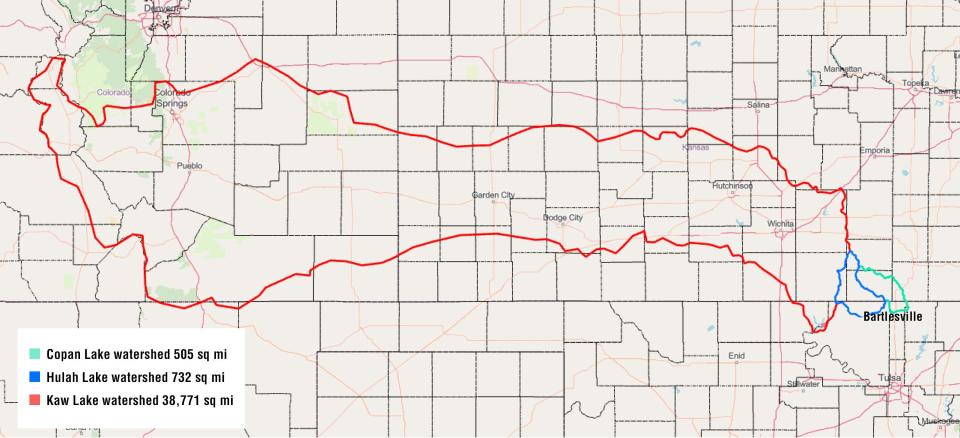Enhancing Bartlesville's water resilience: Council approves key study and pilot project
At Monday night's city council meeting, Bartlesville's water supply was a key focus, leading to the approval of a new study, authorization of further testing and the initiation of a pilot program.
With weekend rains further filling up Bartlesville water reservoirs, city staff breathed a sigh of relief that this year's summer won't be like the last. However, the city council and staff reaffirmed their commitment to solving the long-term water needs of the community.
More: City announces public pools to remain closed unless water supply improves

Pilot program for water reuse
The city has initiated a pilot study to examine the water reuse component of its wastewater treatment plant expansion, announced Water Utilities Director Terry Lauritsen.
This exploratory study aims to ensure compliance with the Oklahoma Department of Environmental Quality standards.
Once it is all up and running, Lauritsen will invite naysayers to tour the new wastewater reuse project.
"I know I have a few people who have been fairly critical of the water reuse concept that I'm going to invite to tour the pilot plant process," Lauritsen said. " I think there are a lot of misconceptions about how clean the water does get."
Lauritsen argued that no one could "determine or distinguish between drinking water from treated wastewater."
However, Lauritsen quickly clarified that the pilot study does not imply an immediate implementation of the water reuse system for potable purposes.
"We are still years out from meeting all of the regulatory steps that are required to operate the city's water reuse program for potable use," Lauritsen said. "This is simply another step in that process."
Once operational, the water reuse system will perform additional treatment of wastewater before discharging it into the Caney River upstream of the raw water intake at Johnstone Park.
Lauritsen explained that water reuse is designed only for emergencies like extreme drought or if the water in Hulah or Copan Lake dropped so low that the Army Corps of Engineers shut off the Caney River's flow.
Additionally, the city council approved service contracts on Monday to monitor and test Contaminants of Emerging Concern (CECs).
"These CECs include prescription and nonprescription drugs, home care products, antibiotics, industrial and household products, hormones, endocrine disrupters and engineered nanomaterials," Lauritsen said. "They would also include the PFASs, or the so-called 'forever chemicals' that we have discussed recently."
Kaw Lake study
On Monday, the council also approved funding for an engineering study to assess the viability of tapping into the water supply from Kaw Lake.
The Water Resources Committee recommended the study to assess Kaw Lakes' water quality, access feasibility and the financial cost of tapping into the lake. Situated about 50 miles west of Bartlesville in Kay County, Kaw Lake has approximately 40 million gallons of water daily rights available, positioning it as a potential lifeline for the city's long-term water needs.
Water Utilities Director Terry Lauritsen highlighted the city's ongoing efforts to explore sustainable water sources.
"In 2006, the city partnered with the U.S. Army Corp of Engineers through the Planning Assistance to States program to determine raw water options for long-term water supply," Lauritsen said. "One of the options investigated was to access water in Kaw Lake."
The initial study projected the pipeline, pump station and water storage rights expenses at $106 million. When adjusted to reflect current values, this estimate has risen to approximately $150 million, according to Lauritsen.
City staff have expressed reservations about the estimate's accuracy, with some internal estimates closer to over $300 million, by comparing it to a similar project in Enid, which prompted the commissioning of the Kaw Lake Water Supply Study.
More: Bartlesville's water supply is dwindling. Could Kaw Lake be the key to supplementing it?
The study's crucial aspects include the compatibility of Kaw Lake's water with the city's treatment systems, options for raw water intake, pipeline alignment and a thorough evaluation of potential environmental impacts.
Additionally, the study aims to outline the estimated costs associated with engineering, easements, environmental considerations and construction, along with the project's cost for different flow rates — 14, 18, and 22 million gallons per day.
The council approved a budget of $112,710 for the study, which is expected to be completed in five months.

This article originally appeared on Bartlesville Examiner-Enterprise: City council focuses on potential water supply from Kaw Lake

